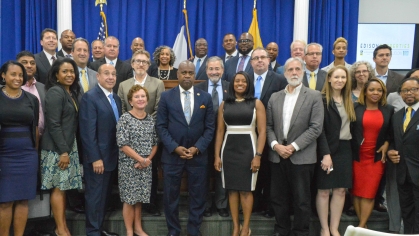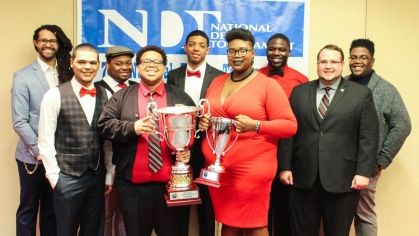Getting To Know Her: An Interview With Chancellor Nancy Cantor
Nancy Cantor takes the helm as chancellor of Rutgers University-Newark. Connect newsletter editor Helen Paxton sat down with her this past fall to learn more about her ideas and plans for R U-N.
What are the qualities of Rutgers -Newark that confirmed your interest in becoming our next chancellor?
Rutgers-Newark is an amazing place! Its identity as a research university, strong in the liberal arts and the professions, that is profoundly aware and proud of its legacy as an engine of social mobility and deeply engaged with its community, makes me incredibly excited to be here. My career trajectory—from my work in social psychology on insider-outsider dynamics to my work in higher education on expanding opportunity, fully tapping the talent of our communities, and cultivating expansive notions of scholarship—leads me here quite naturally. This community, our nation, and our world are at an inflection point at which it is absolutely critical for our urban anchor institutions like Rutgers-Newark to realize their potential and catalyze collaboration across sectors to take on the great challenges we face together. To me, there’s no better encapsulation of what democracy really means and there’s no better place than Rutgers-Newark to work on this. And on top of all that, being from the metro area, I am thrilled for this homecoming.
What are your priorities for your first 12 months at Rutgers?
My highest priority right now is to listen to and learn from the outstanding faculty and staff of the university, as well as our current and potential partners in Newark and beyond. This is a time that I think calls for a 21st century version of a community “barn-raising”—bringing the campus community and the people of our city and region together to roll up our sleeves and work on our shared goals-- expanding access to higher education, increasing economic opportunity—especially by tapping talent where it remains untapped—and making the most of our collective intellectual and human capital.
Outside of the daily priority of working together to make this the best place it can be for our students and our faculty, I really want to build upon the strong, reciprocal relationships that so many from campus already have forged with public, private, and nonprofit sector partners. This is a university and a city that really get the idea that expertise in taking on today’s complex challenges simply must come from every direction, from what I like to think of as “communities of experts.” This is something we worked on very hard at Syracuse, and I think we and our partners built a robust infrastructure that leverages the particular strengths of the university and the community. I’m really eager to get to know Rutgers-Newark and the city and region better and figuring out together how best to leverage the strengths of this community, especially the diversity that may be our greatest asset.
How do you see the next stage of redevelopment in the city of Newark?
I think Newark is one of the most exciting cities in the country. It has always been a major center for business and culture, even during some of the most challenging economic times of the 20th and 21st centuries. I’m aware that there is a huge current round of investments in developing cultural institutions, in building new business, in real estate development, in improving urban infrastructure, expanding the educational opportunities both K-12 and beyond, and energizing the remarkable talents of residents in neighborhoods plagued by high poverty but full of hope and potential. I believe that Newark in the next 10 years increasingly is going to be seen nationally and internationally as a place to watch.
What responsibilities, if any, do public universities such as Rutgers have to help reverse the ever-widening economic divide in our country?
We have mountains of evidence that the “American dream” is tragically so out of reach for so many Americans and the trend line is toward increasing disparities. In fact, the Organization for Economic Development and Cooperation currently ranks the U.S. below almost every other developed country in social mobility. In the mid-19th century – one of the most divisive eras in American history – the Morrill Act was created to develop land grant universities. The mission then was to train the sons and daughters of farmers and integrate the universities into the economic life of their states, which at the time was mostly agricultural. I believe our country needs a new Morrill Act now – in spirit, if not in law—that leverages the unique position of our public institutions to genuinely open the road to opportunity through education for those who remain on the margins, to reinvent liberal education for our time, and to bring higher education out of the “ivory tower” and into the world.
Are the differences between private and public universities less substantial now than they were in the past?
Public universities, especially “land grant” universities like Rutgers, have always had strong connections to their communities, more so than most private universities. Yet as our economy changes, private universities are becoming more like publics, and vice versa. Rutgers and other publics have had to adjust to public funding that has not kept pace with the rapidly increasing demands placed on our universities. Publics need to get better at diversifying partnerships with alumni, foundations and corporations. So the two are much more similar now than they were in the past. The key for publics today is to find ways to be as flexible, nimble, and agile as privates can be, while remaining very responsive to the public we serve.
What is most enticing to you as you think about how you will spend your “leisure time” once you are a resident of Newark?
I was born and raised in the New York area, and it’s exciting to be back! I’ve already developed a deep appreciation for Newark’s history, the vitality of its people and neighborhoods, and incredibly vibrant cultural life. As I’ll be living with my husband, Steve (Brechin) downtown, close to campus, I plan to be a frequent visitor to NJPAC, to The Newark Museum, and other cultural venues in R-N‘s neighborhood. And as you can probably guess we’ll also be taking advantage of Newark’s proximity to that other city across the Hudson River!


